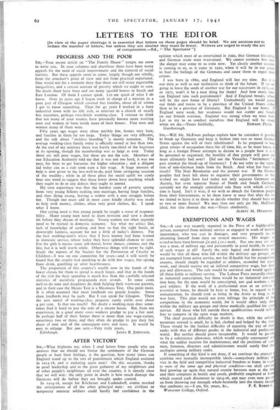AFTER VICTORY Sm,—What frightens me, when I read letters from
people who are anxious that we should not bruise the sentiments of the German people or hurt their feelings, is the question, how many times can England stand up to the sort of punishment which England endured in 1914-18, and is enduring again now? - On this occasion, thanks to good leadership and to the great gallantry of my neighbours and of other people's neighbours all over the country, it is already clear that we will win : the only point in doubt is how much damage the Germans will do before they are brought under control.
In 1914-18, except for Kitchener and Ludendorff, events mocked the anticipations of all the other principal men: we civilians or temporary amateur soldiers could hardly fed confidence in the opinion which most of us entertained in 1920, that German friendship and German trade were overvalued. We cannot estimate how nez the danger may come to us even now. Yet clearly another occasion is coming to us, as it came in 1920, when it will be in our power to hurt the feelings of the Germans and cause them to regret the crimes.
I was born in 188o, and England will last my time. But it is our duty as well as our inclination to think of the future. If we are going to leave the seeds of another war for our successors in 197o, say, or 1975, won't it be a near thing for them? And how many times can England take such punishment? And if England breaks, where will be the new home of liberty? Undoubtedly we would prefer our fields and towns to be a province of the United States rather than to be a province of Germany. But England is our home. If England were weak, her weakness would not confer any benefit on our friends overseas. England was strong when we were born. Let us try to so conduct ourselves that England will be strong






























 Previous page
Previous page